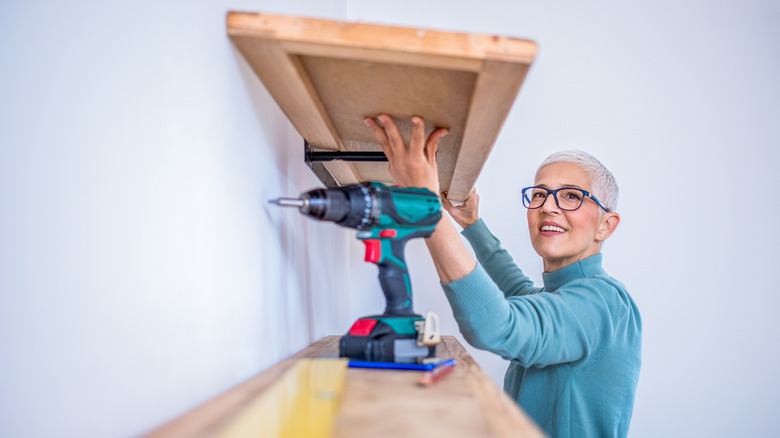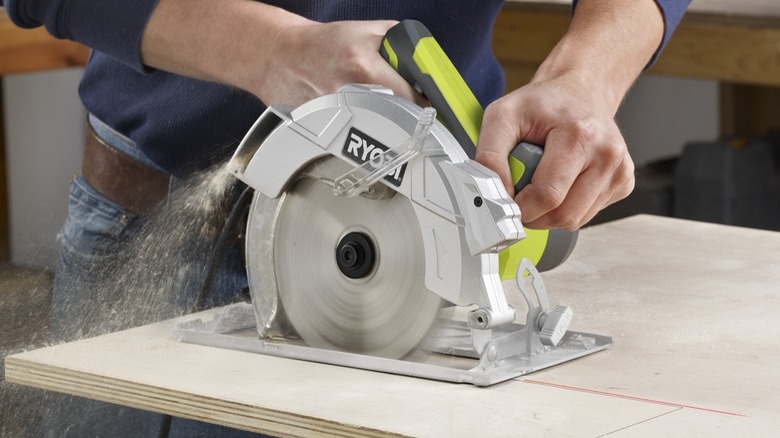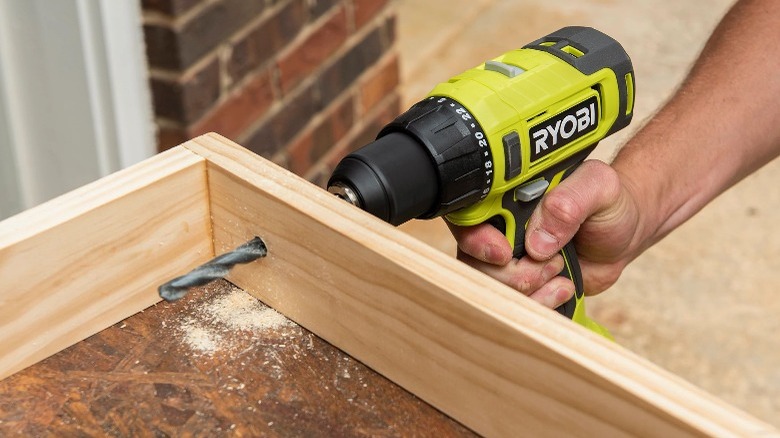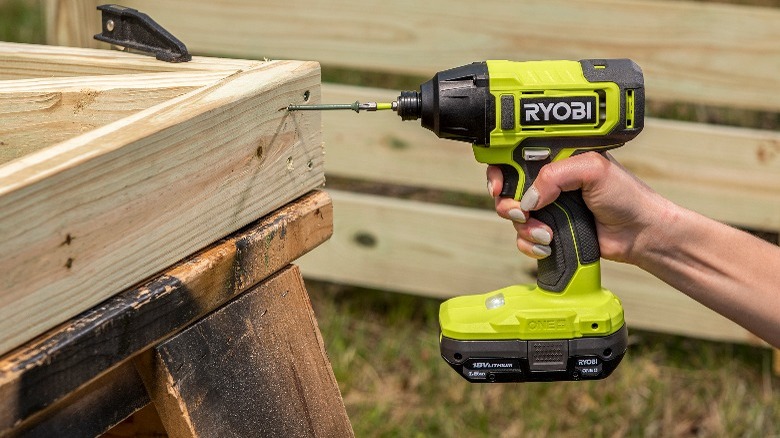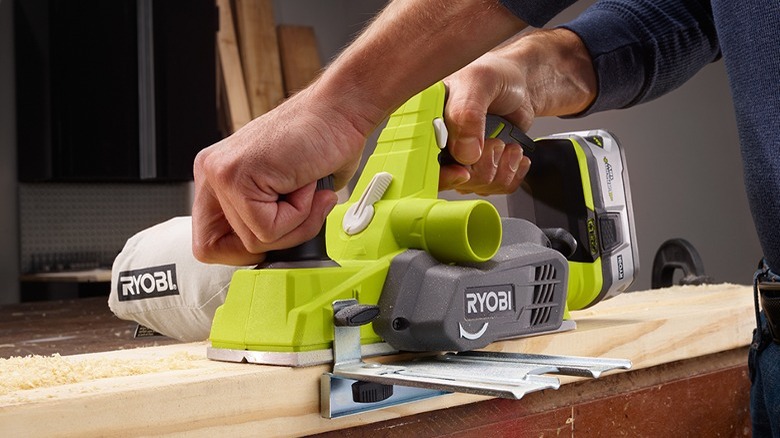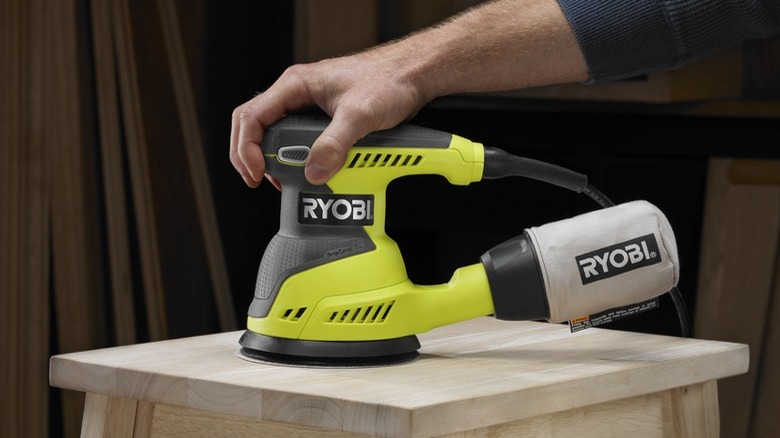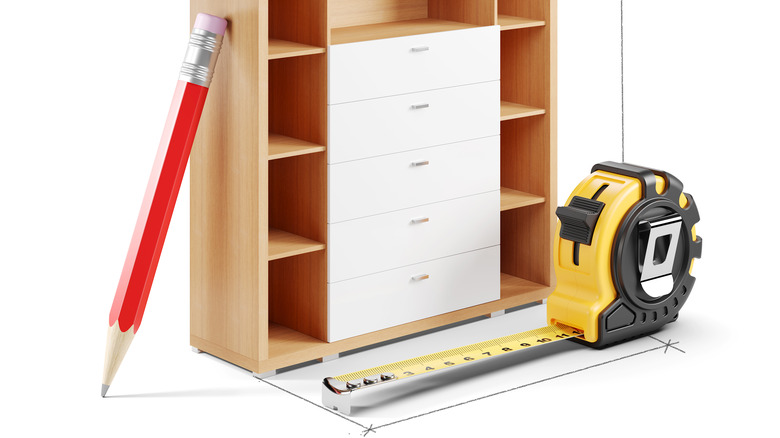5 Ryobi Tools That Will Come In Handy When Building Custom Shelves
There are a lot of great reasons to build your own custom shelves. You get to choose the color and grain of the wood for starters, but the main benefit is that you get to customize the dimensions. No Ikea bookcase will ever fill a space as perfectly as one you build yourself. Plywood and hardwood also tend to be much sturdier than the particle board that has seems to have become the standard in most mass-produced shelving units. This means that your custom shelves will likely last longer, and you might even manage to save a bit of money on construction materials. But you're also going to need the right tools.
Ryobi makes a wide range of power tools that can be useful while building custom shelves. Exclusive to The Home Depot, this brand isn't exactly known for making the most powerful tools on the market, but it has built up a sound reputation for balancing reliable performance with affordability, which all adds up to tools that both pros and novices love. This cost-benefit ratio has made Ryobi one of the most popular power tool brands on the market, and it makes the green-coded tools a top choice for budget-minded builders. I've used numerous Ryobi tools over the years and personally just finished building and installing nine custom-built bookcases in my home. Here are five Ryobi tools that will come in handy when you're ready to start building your own custom shelves.
7¼-inch Circular Saw
Once you've double measured the space and meticulously made plans for your custom shelves, it's finally time to start cutting the lumber. There are many different types of saws that can help with this task and each specializes in different methods of cutting wood. Table saws are best suited to long rip cuts on narrow boards, while miter saws (aka chop saws) are best suited to short cross-cuts. Jigsaws are ideal for wavy, circular, and other non-linear cuts. Ryobi makes all these tools, but a good circular saw is probably the best they make for cutting custom shelves.
Circular saws excel at making straight cuts on long lengths of wood. It's the best tool for breaking down large sheets of plywood and for making cross-grain cuts on boards that are too wide to fit on a miter saw. They also tend to be a lot cheaper.
Ryobi makes several of these, but it's hard to go wrong with the basic 7¼-inch Circular Saw. You can spend more money on a cordless saw if you want, but you can't beat the power, reliability, and affordability of the plug-in model. This tool has a 13-amp motor, (though they also sell 14- and 15-amp versions,) which should be more than sufficient for all but the densest hardwoods. It comes with a 20-tooth, carbide-tipped combination blade. It has a built-in guide that you can use to line up your cuts and has depth adjustment settings that you can use to minimize tear out and keep the saw from hitting the floor when cutting on plank supports.
18V One+ ½-inch Drill/Driver Kit
You might be building a framed bookcase-style shelving unit or you could simply be making a bunch of wall-mounted shelves. In either case, you're going to need a good drill. A power drill is an essential tool for any home improvement kit and Ryobi makes a couple of great ones.
One of the better options Home Depot sells is the 18V One+ ½-inch Drill/Driver Kit. The company also sells a ⅜-inch kit which you could probably get by with just fine, but the larger chuck on the ½-inch kit allows you to use a wider range of bits. This might not seem like a big deal right away, but you'll probably find that it's worth investing a bit more money now in a tool that will offer more utility in the long run.
The ½-inch drill can provide up to 515 in./lbs. of torque. This is sufficient for drilling pilot holes in hardwoods and more than sufficient for drilling into wall studs, so making custom shelves shouldn't offer any problems. This driving power is controlled via a 24-speed clutch. The drill also has a work light to help you see what you're drilling and a two-speed gearbox that provides different rotation settings. It can either operate at 0-450 RPM when you need more control or 0-1,750 RPM when you need speed.
18V One+ ¼-inch Impact Driver
If you're looking to save money, you can get by with just a drill at first. The adjustable chuck on a drill allows you to drive fasteners with it as well as a drill bit. That said, there is another tool that is built to do the job much more efficiently. Impact drivers offer significantly more torque, making them faster and easier to drive fasteners into dense materials. It does this by using a combination of strong rotational force and a hammer-like mechanism that 'taps' the fastener in, so the tool isn't completely relying on you for downward pressure.
Ryobi makes a 18V One+ ¼-inch Impact Driver, which is an excellent addition to any tool kit. The motor in this driver provides 1,800 in./lbs. of torque and has a quick connection collet, making it easy to swap bits on the fly. This driver also has a built-in LED to illuminate your work and can reach speeds up to 3,400 IPM. So, while you might not need an impact driver to build a set of custom shelves, having one can certainly make your work go a lot faster and easier than just working with a regular drill.
Best of all, since it works on the same One+ battery system, you can get both without having to worry about separate batteries or chargers. Ryobi even sells them in a combo kit if you want to buy them together.
18V One+ 3¼-inch Planer
A good electric hand planer is one of those tools that ends up having more utility than you might initially think. Electric planers use a rotating blade that scoops material away along a flat surface, so it can be useful for flattening out uneven boards when you're working with rough-cut lumber, but it's also handy for straightening edges or for tidying up excess wood when your glue-ups aren't butting together as expected.
There are a few different models available, but this is an instance where it might be worth splurging for the cordless version. The 18V One+ 3¼-inch Planer is a fantastic tool if you plan on investing in Ryobi's cordless battery system. The freedom of movement and lack of tether means that you will easily access any of the areas on your project without having to deal with messy extension cords. It also comes with a lot of great features, like an automatic kickstand, which helps keep the planer aligned so you don't accidentally remove more wood than you mean to, and it has a dual chip exhaust system that comes with a dust bag and allows you to choose which side of the tool the material is removed from.
5-inch Random Orbit Sander
Finally, you're going to want to sand your shelves once they're cut and assembled. You could always just buy some sandpaper and start smoothing out your pieces by hand, but why not let a power sander do the work? There are a few different kinds of power sander out there, but one of the best all-around sanders to keep in your tool shop is a random orbit sander. These rotate circular disks of sandpaper in constant and irregular overlapping circles. This method combines the speed and aggressive grind of a belt sander with the ability to produce a finer finish since the circular orbits help to prevent marks from uneven sanding on the wood.
Ryobi makes a cordless 5-inch random orbit sander, but this is another instance where you might be better off with the corded version. Sanding takes a long time and requires a lot of constant power, so you'd need to invest pretty heavily in the One+ battery system if you wanted to have enough juice to finish an entire project without having to stop and wait for a recharge.
The corded Ryobi 5" Random Orbit Sander has a 2.6-amp motor which can produce up to 12,500 orbits per minute. This isn't the most powerful sander on the market, but it's more than sufficient for finishing a set of custom shelves. It also comes with a built-in dust bag to help minimize mess.
Our methodology
I've been woodworking and practicing home repair for many years and have spent more than my fair share of time working with Ryobi brand power tools. I also recently built and installed several floor-to-ceiling bookcases in my own home, giving me first-hand experience with the process. To choose the products for this list, I took the tools that I needed for my own recent project and compared them to those that are available in Ryobi's current catalog. From there, I chose the tools that I felt were best suited to the task of building custom shelves. I picked models that struck a balance between affordability and convenience while making sure that the specs listed were powerful enough to work with the necessary materials.
